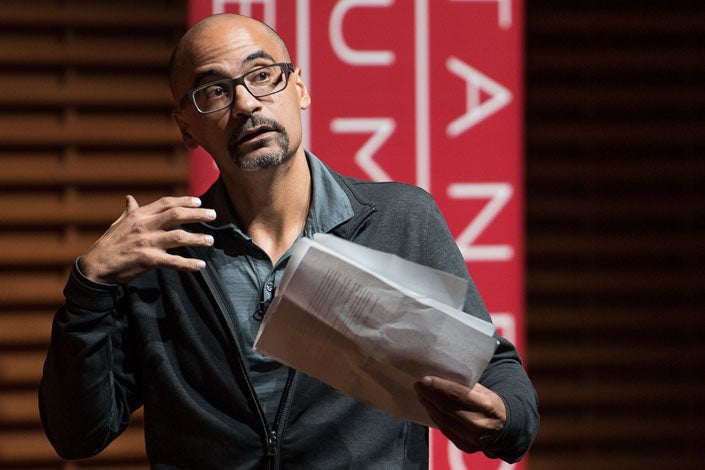Pulitzer Prize-winning author and activist Junot Díaz encouraged people of color, undocumented immigrants and other minority group members to stick together and help each other during a turbulent political climate as part of his lecture Wednesday evening at Stanford.
“We must steal fire because we must transform this world that conserves and hoards fire for only an elite few,” Díaz said.

Author Junot Díaz delivered this year’s Presidential Lecture in the Humanities and Arts. (Image credit: Steve Castillo)
Díaz took the stage at CEMEX Auditorium as part of the Stanford Presidential Lectures in the Humanities and Arts series, which brings distinguished scholars, artists and critics to Stanford every year. The event is administered by the Stanford Humanities Center and funded by the Office of the President.
Díaz is the author of The Brief Wondrous Life of Oscar Wao, a 2007 novel that earned him the Pulitzer Prize and the National Book Critics Circle Award in fiction. He also wrote the critically acclaimed Drown and This Is How You Lose Her. He has been honored with a MacArthur Fellowship, a Guggenheim Fellowship, the PEN/Malamud Award, the Dayton Literary Peace Prize and other awards for his writing.
Comparative literature Professor José David Saldívar introduced Díaz, who previously spoke at Stanford in 2012. He said Díaz’s work “offers powerful insights into the realities of the Caribbean diaspora and the Latino experience.”
“Díaz writes from the vantage point of his own lived experience, eloquently unmasking the many challenges of the immigrant’s life,” said Saldívar, who is writing a book about Díaz and his work. “Through skillful use of raw and tender vernacular dialogue and spare, unsentimental prose, Díaz creates nuanced and engaging characters struggling to succeed and often invisible in plain sight of the American mainstream.”
An avid activist supporting immigrant rights, Díaz addressed the plight of marginalized groups and offered advice to those who feel oppressed in the current political and social climate in the United States.
“White supremacy is out in ways that I haven’t seen before, and I thought I’ve seen it all,” Díaz said. “We really need to fight in ways we’ve never fought before.”
Díaz encouraged students to take advantage of resources that surround them during their time in college.
“You must educate yourself in the system that you inhabit,” Díaz said. “This is a select college. You’ll never be in this kind of environment again.”
He emphasized the importance of connecting with other people in one’s community and building support systems. Students should set aside the competitive mindsets society encourages and come together, he said.
“We need to get in the business of each other’s freedoms in important ways,” he said.
Toward the end of his lecture, Díaz also offered words of encouragement and inspiration to members of minority groups who may feel scared and uncertain of what the future holds for them. He asked people of color to remember and honor their ancestors and the civil rights strides they made, and that every breath they take is a condemnation of colonialism and patriarchy.
“Each breath is the sound of chains breaking. Each breath is, in its own way, a revolution,” Díaz said.